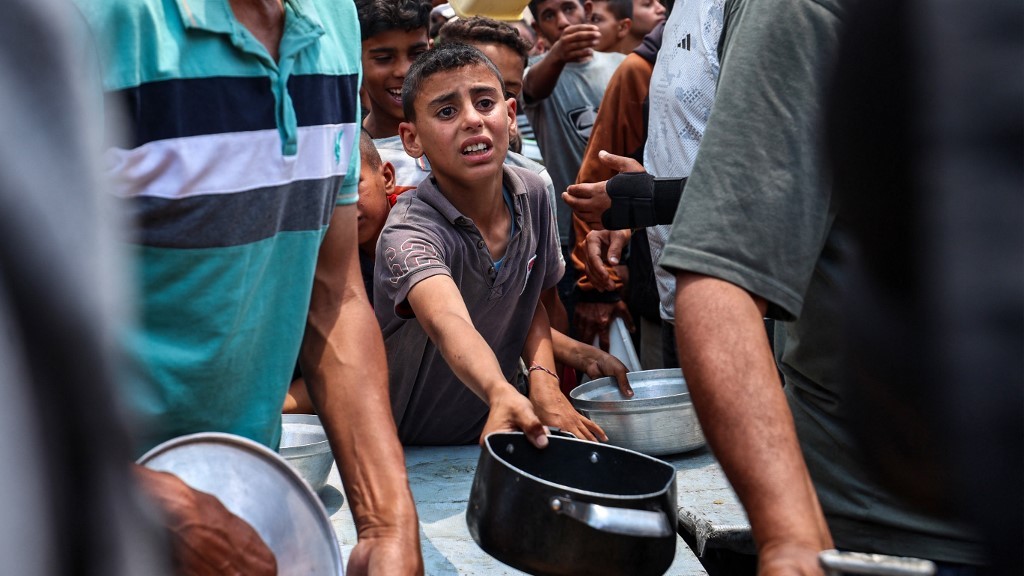Israel denies doctors entry into Gaza as Palestinians starve to death

Israel has denied entry to a group of doctors and humanitarian workers hours before they were set to enter Gaza on Thursday as the Palestinian health minister announced that 29 children and elderly people in the enclave have died from starvation in recent days.
The group of six were prepared to leave Jordan on Thursday morning with a UN convoy, but received notice late on Wednesday that they would not be permitted to enter Gaza, according to two sources in contact with the group.
Cogat, the Israeli military unit overseeing movement logistics between Gaza and Israel, did not immediately respond to Middle East Eye's request for comment.
Aid groups and healthcare workers have complained for months about restrictions imposed by Israel, including repeatedly rejecting and limiting their entries as the humanitarian situation in the enclave worsens.
The latest incident comes amid growing international outrage over the situation in Gaza, where Israel enforced a total blockade on the entry of medical, food and fuel supplies which began on 2 March.
New MEE newsletter: Jerusalem Dispatch
Sign up to get the latest insights and analysis on Israel-Palestine, alongside Turkey Unpacked and other MEE newsletters
Over two months later, nearly half a million Palestinians face catastrophic hunger. Earlier this week, UN humanitarian chief Tom Fletcher said that 14,000 babies could die within 48 hours if aid did not reach them.
On Thursday, Palestinian Health Minister Majed Abu Ramadan announced that 29 children and elderly in Gaza have died of starvation-related deaths in recent days and said the 14,000 figure "is very realistic may be even underestimating (the scale)".
A healthcare worker who was recently denied entry into Gaza said it was unclear by what standards Israel was deciding which doctors and humanitarian workers were allowed in and which were blocked.
He declined to be named because he plans to try to enter Gaza again, but given the current situation said he couldn't quite process Israel's logic.
"I don't really understand why the Israelis are even entertaining this," he said on Thursday. "If they've blocked everything else, why not do the same for healthcare workers?"
But he went on to say he believes that even the restricted numbers of healthcare workers would be used by Israel in the future to justify its actions in Gaza, noting one of Israel's key arguments at the International Court of Justice in January 2024 was to point to humanitarian aid that it had let in.
"This is effectively a humanitarian alibi, a cover for violence," he said.
"They'll turn around in years and decades to come when all of these cases are still ongoing and they'll say, 'Oh, we let 250 doctors into Gaza. So how on Earth does that mean we were genocidal?' Our presence will be misused to make certain claims."
Trickle of aid
On Sunday, Israeli Prime Minister Benjamin Netanyahu said a "basic amount of food" would be allowed in at the Israeli military's recommendation to "ensure a famine crisis does not develop", but only until the military and private companies set up hubs to distribute aid under a new plan which has been rejected by United Nations agencies responsible for international humanitarian efforts.
That plan appears to be moving forward at speed. As MEE reported on Wednesday, Safe Reach Solutions, the US-based private military contractor set to oversee Gaza aid distribution on Israel's behalf is actively hiring on LinkedIn.
On Wednesday evening, Cogat reported that 198 trucks carrying food, medicine and wheat flour had entered Gaza.
About 90 truckloads of goods were subsequently collected by humanitarian organisations for distribution, the UN's Office for the Coordination of Humanitarian Affairs (Ocha) said on Thursday.
It warned that significant challenges in dispatching the aid remained over insecurity, risk of looting, delays in coordination approvals and inappropriate routes being provided by Israeli forces.
"Today will be crucial," said Fletcher, the UN humanitarian chief. "Truckloads of lifesaving aid finally on the move again. I’m in awe of the courage of our humanitarians - but they continue to face huge challenges getting goods out of the crossing to where it is needed."
Later on Thursday, Younis Al-Khatib, president of the Palestinian Red Crescent Society, told reporters that the aid deliveries have yet to reach people in Gaza.
He said: "No civilian has received anything yet. In fact, say most of these trucks are still in Karem Shalom at the border, inspected, but not into Gaza."
middleeasteye.net